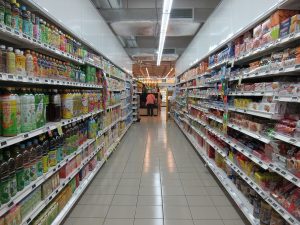
The first nine days of the month of Av, known as the Nine Days, is a period of time established by the Rabbis to mourn the destruction of the two Batei Mikdash. To make us feel the aveilus, there are certain activities which are prohibited during this period. Since the Talmud tells us that only one who has properly mourned the Temple’s destruction will merit seeing its rebuilding, it is important to become more knowledgeable about the exact nature of the prohibitions of the Nine Days. One of them, the injunction against “buying new items,” is reviewed here.
Question: Is it permitted to go shopping during the Nine Days?
Discussion: There are two types of items which are forbidden to be bought during the Nine Days: 1) Items which the consumer buys to give him pleasure or joy (as opposed to items which the consumer needs for daily living). 2) Apparel (clothing). As each group has its own rules and regulations, we will discuss each one separately.
Items of Joy or Pleasure
In order to diminish the level of simchah during this sad time, the Rabbis forbade buying items that mainly serve to give the owner joy or pleasure. Thus it is forbidden, for example, to purchase silver dishes, jewelry, fancy china, home decor items, or a car that is used mainly for pleasure travel. 1 But it is permitted to purchase standard household items that are needed, even if they are major purchases such as an air conditioner, a set of dishes, a cell phone, a health-related appliance, or a car that is used mainly for business or every-day household needs. 2 [If the business item being bought would normally require the recital of shehecheyanu, the shehecheyanu is said after Tishah b’Av. 3 ] Only actual buying is prohibited—shopping without buying is permitted. Window or comparison shopping is permitted. 4 Returns are permitted. Exchanges may be prohibited. 5
If delaying the purchase will cause a monetary loss, or if the item will not be available for purchase after Tishah b’Av, it is permitted to buy the item during the Nine Days. 6 If possible, it is recommended to merely put down a deposit and take delivery of the item after Tishah b’Av. 7
It is permitted to buy items for the purpose of performing a mitzvah, e.g., buying tefillin or seforim that are needed at the time. 8 Similary, a bachelor who is getting married after Tishah b’Av may shop during the Nine Days if need be. 9
Shopping for Clothes
The second category of items that may not be purchased—or worn—during the Nine Days is clothing or shoes, even if they are intended for use after the Nine Days. 10 Both expensive and inexpensive items, even trivial articles of clothing such as a pair of socks, a belt, a yarmulke, or a kerchief, are included. 11 A new tallis or a tallis katan may also not be purchased. 12 Linen and towels are considered “clothing” and are prohibited to be purchased as well. 13
In the following cases it is permitted to shop for clothing during the Nine Days:
•If one has no clean shirt for Shabbos and washing or cleaning a shirt is not option, he may [buy and] wear a new shirt. 14
•A bachelor who is getting married after Tishah b’Av may buy whatever he needs for the wedding during the Nine Days. 15
•One who does not have appropriate shoes to wear on Tishah b’Av may buy them during the Nine Days. 16
•Although it is permitted to wash clothing for infants, toddlers and small children who constantly soil their clothes, 17 one is allowed to purchase new baby’s and children’s clothes rather than do their laundry. 18
•If delaying the purchase will cause a monetary loss, or if the item will not be available for purchase after Tishah b’Av, some poskim permit buying the item during the Nine Days, 19 while others are more stringent. 20 If a substantial loss is involved, a deposit should be made and delivery taken after Tishah b’Av.
•It is permitted to [buy and] wear new clothes for the purpose of a shidduch. 21
•People in the clothing business may purchase stock during the Nine Days. 22
•The prohibition against shopping during the Nine Days begins with sunset of Rosh Chodesh Av and ends at midday of the tenth day of Av. When Tishah b’Av falls on a Thursday, it is permitted to shop for Shabbos needs on Thursday night.
Question: Which types of clothing are included in the prohibition against wearing freshly laundered clothes in the Nine Days?
Discussion: Shulchan Aruch rules that all freshly laundered (or dry-cleaned) clothes and linens (such as towels, sheets and tablecloths), may not be worn or used during the Nine Days. 23 It has become customary, therefore, that freshly laundered clothes are worn for a short while24 before the onset of the Nine Days, so that the clothes are no longer considered “freshly laundered.”
Contemporary authorities debate whether or not garments that are constantly being changed because of perspiration — like socks and undergarments — must also be worn briefly before the Nine Days. Some poskim hold that they must, 25 while others hold that such garments are not included in the prohibition of wearing freshly laundered clothes and one need not prepare them before the Nine Days begin. 26 The widespread custom in the United States follows the second opinion.
Question: In practical terms, how should one conduct himself with regard to the Nine Days’ prohibition against full-body bathing?
Discussion: One of the Nine Days’ restrictions is the prohibition against bathing and showering. 27 Nowadays, people find it most uncomfortable to observe this restriction, since we are all accustomed to bathing or showering daily, unlike in earlier times when people bathed much less frequently. It is important to distinguish between the two reasons why people bathe: 1) for reasons of hygiene and cleanliness; 2) for pleasure; the hot water soothes them, the cold water cools them — it is a pleasurable experience. It is safe to assume that most people bathe or shower for both reasons — for cleanliness and for pleasure. It is clearly forbidden to bathe or shower during the Nine Days for pleasure. Thus it is forbidden to take a hot bath, a long, hot, relaxing shower, or to go swimming in a lake or a pool. The primary purpose of these activities is the pleasure derived from them. But one who became dirty or sweaty and must take a shower in order to rid himself of the odor, dirt or sweat, may take a short, cold or lukewarm shower. If he requires soap or shampoo in order to remove the dirt or sweat, that is permitted as well. If the dirt or sweat cannot be removed unless hot water is used, hot water may be used for those areas where it is needed. 28
One who needs to take a hot shower or bath or go swimming for medical reasons is permitted to do so.
1. O.C. 551:2, Mishnah Berurah 11 and Sha’ar ha-Tziyun 13; Aruch ha-Shulchan 551:20; Kaf ha-Chayim 551:21, 23; Igros Moshe, O.C. 3:80. See also Nitei Gavriel, pg. 51, quoting the Rav of Puppa.
2. See Koveitz Halachos L’ymei Bein Hametzarim, pg 125; Halichos v’Hanhagos, pg. 5, quoting Rav Y.S. Elyashiv; Kol ha-Torah, vol. 56, pg. 48, quoting Rav B. Rackove; Vayevareich Dovid 1:69. See also Teshuvos Levushei Mordechai 3:185-4.
3. Igros Moshe, O.C. 3:80.
4. Igros Moshe, E.H. 4:84-1.
5. Since the shopper is getting a new item in exchange for the old one, it may be considered as if he is buying the item anew. If the new item requires a shehecheyanu, the exchange may definitely not take place during the Nine Days; see Moadei Yeshurun, pg. 152, note 31.
6. Peri Megadim 551:7; Mishnah Berurah 551:11,13; Kaf ha-Chayim 551:21, 23; Igros Moshe, E.H. 4:84-1.
7. Kinyan Torah 1:109-5.
8. Igros Moshe, O.C. 3:80.
9. Mishnah Berurah 551:46. Other poskim disagree with this leniency; see Kaf ha-Chayim 551:30, 33 and 101.
10. Rama, O.C. 551:7 and Mishnah Berurah 45 and 49.
11. Mishnah Berurah 551:45-46; Rav C. Kanievsky, quoted in Nechamas Yisrael 13:3.
12. Igros Moshe, O.C. 3:80.
13. Nitei Gavriel 31:9.
14. Beiur Halachah 551:6, s.v. keilim, as explained by Igros Moshe, O.C. 3:80.
15. Mishnah Berurah 551:14 and 46. Other poskim disagree with this leniency; see Kaf ha-Chayim 551:30, 33 and 101.
16. Igros Moshe, O.C. 3:80.
17. Rama, O.C. 551:14.
18. Mishnas Yaakov (quoted in Piskei Teshuvos 551:27 and in Nechamas Yisrael 13:7). See Emes l’Yaakov, O.C. 551, note 513, who suggests that buying might be preferable to doing laundry.
19. Kinyan Torah 1:109-5; Koveitz Halachos (Rav S. Kamenetsky), pg. 178.
20. Emes l’Yaakov, O.C. 551, note 509, who questions if it is permitted to buy apparel on sale during the Nine Days.
21. Orchos Rabbeinu, vol. 2, pg. 132, quoting Chazon Ish.
22. Mishnah Berurah 551:11.
23. O.C. 551:3.
24. There are several views — ranging from several days to several minutes — as to how long a garment should be worn in order for it be considered no longer fresh. In actual practice, the garment should be worn long enough so that it loses that special crispness and freshness that one associates with freshly laundered or dry cleaned clothes.
25.Kaf ha-Chayim 551:91; Orchos Rabbeinu, vol. 2, pg. 130; Minchas Yitzchak 10:44; Harav C. Kanievsky, quoted in Nechamas Yisrael 19:7.
26. Aruch ha-Shulchan, Y.D. 389:6 (concerning shivah); Gesher ha-Chayim 21:10 (concerning shivah); Salmas Chayim 4:4; Harav M. Feinstein (oral ruling, quoted in Rivevos Efrayim 1:377 and 3:340, Moadei Yeshurun, pg. 134 and Kitzur Hilchos Bein ha-Meitzarim, pg. 9); Kinyan Torah 1:109; mi-Beis Levi, vol. 13, pg. 26.
27.O.C. 551:16.
28.Entire Discussion based on Aruch ha-Shulchan 551:37; Harav Y.C. Sonnenfeld (Salmas Chayim 4:20; Toras Chayim, pg. 83); Igros Moshe, E.H. 4:84-4; Emes l’Yaakov, O.C. 551, note 14; She’arim Metzuyanim b’Halachah 122:12; Shevet ha-Levi 7:77.
Weekly-Halacha, Text Copyright © 2013 by Rabbi Neustadt, Dr. Jeffrey Gross and Torah.org.
Rabbi Neustadt is the Yoshev Rosh of the Vaad Harabbonim of Detroit and the Av Beis Din of the Beis Din Tzedek of Detroit. He could be reached at [email protected]


